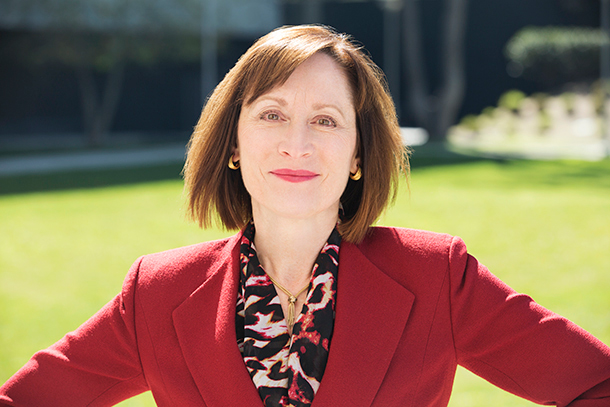Grace Baranek, PhD, is the newly appointed associate dean and chair of the USC Chan Division of Occupational Science and Occupational Therapy. She had previously been at the University of North Carolina at Chapel Hill, where she was associate chair for research in UNC’s Department of Allied Health Sciences and professor in their Division of Occupational Science and Occupational Therapy. The proud Chicagoan, who arrived on campus in February, spoke with HSC News about her appointment, the assets at USC Chan and what she’s learning about life in Los Angeles.
What inspired you to take the “leap” from the university where you matured during the past 20 years to a new leadership role at a new institution?
I was very happy where I was, but the leadership opportunity at USC Chan was so enticing. As a private university in a large metropolitan area, USC offers unparalleled resources, particularly a large faculty with tremendous expertise in so many innovative areas of practice, research and education. Knowing that a stellar senior leadership team was in place also helped my decision to become a Trojan!
In the short time that you have been on campus, what stands out as particularly unique about USC within the fields of occupational science and occupational therapy?
USC Chan has such a broad reach, both locally and globally. Our educational programs span all levels, from the undergraduate minor to the PhD, and that breadth enables us to reach an array of students who embody the core values of the field and can go on to make an impact on the health and well-being of society in extraordinary ways.
As a renowned scientist who has previously been principal investigator on multimillion-dollar federal grants researching sensory features of children with autism spectrum disorder, what is on the near-term agenda for your line of research?
First is assembling a strong team of scientists, including potential interdisciplinary collaborators on campus and stakeholders in the community. I’ll be building upon my previous research in early identification of and intervention for infants at-risk for autism spectrum disorder, with the intention of scaling up to larger, multi-site research projects. Eventually, I’m hoping to translate findings to clinical and community settings, in hopes of establishing a more sustainable impact on children’s participation in everyday activities and routines.
You succeed Florence Clark, USC Chan’s previous leader of more than 25 years; what have you learned from her as she passes the leadership torch on to you?
Dr. Clark has been a tremendous leader and role model for our whole field! She has been able to push occupational therapy beyond its comfort zones and expand the boundaries of what were once considered traditional models. She’s shown me how to leverage strengths and align resources in order to realize a vision of USC Chan well into the future.
What has been most surprising about life in Los Angeles so far, and what has lived up to the hype?
That people say “the” before freeway numbers, as in “I’m taking the 10 Freeway!” And that “Trojan Family” is an apt metaphor, given how spirited, warm and welcoming everybody has been!
— Mike McNulty


